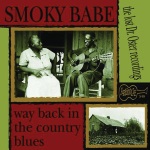Unlike his Baton Rouge-area contemporaries Robert Pete Williams, Butch Cage and Willie B. Thomas, Smoky Babe (aka Robert Brown) never made it to the blues-revival stages of the ’60s, nor was he part of the cadre of bluesmen like Slim Harpo, Lightnin’ Slim and Lazy Lester that defined Louisiana blues in the late ’50s.
It’s doubtful that he ventured far from his Scotlandville base, let alone gigged professionally around Baton Rouge. It only was by chance that he met LSU folklorist Dr. Harry Oster, which led to Oster recording three albums released on his Folk-Lyric imprint. Oster left LSU in ’63, sold his treasure trove to Arhoolie in 1970, and passed away in 2001. Somehow the last of the Smoky Babe tapes never made it to Arhoolie until recently, giving the world another glimpse of one of the most intriguing bluesmen that ever lived.
If he were ever recognized on merit, Babe would have made the list with his more famous contemporaries. His guitar playing is dead on and rhythmically rooted with occasional blitzing, finger-picking runs on the high strings in between his heavy down strokes. Like a good solo performer, Babe’s textures vary, sometimes with driving one-chord boogies and sometimes by digging into the lower strings for a darker contrast. While it’s hard to fault anything about his style, as evidenced by this high-grade field recording, his confident baritone vocals are more prominent.
Of the 17 tracks listed here, 16 are Babe originals, with Robert Johnson’s “Terraplane Blues” being the lone cover. Whether it’s escaping to Chicago, digging up potatoes or whining about women, Babe was one of those rare bluesmen who was raw but refined in his approach while delivering entertaining blues fodder.
A great discovery.





